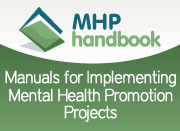Tools
- Utilities:
- Print this page
- Send this page
- Font size:
- Increase font size
- Decrease font size
Monitoring Suicidal Behaviour in Europe
01/06/2007 - Submitted by: Argyro Kazaki
The project aims to reduce the frequency of suicide, suicide attempts and the repetition rate of suicide attempts in various European countries, by assessing the magnitude of the problem (monitoring of suicides and suicide attempts), the identification of groups at risk, risk factors, and specific variables (methods, “hot spots”, time variables etc.) which can be influenced to prevent this behaviour. Based on these findings guidelines for prevention of suicides and suicides attempts should be developed, e. g. regulations for access to suicide means, prevention of suicide imitation recommendations for the selling of pharmaceuticals used for suicide attempts, guidelines for secondary and tertiary suicide prevention (treatment of suicide attempters). Through a common assessment, studies of preventive measures in various centres, and the evaluation of such measures in a large number of EU and candidate countries it will be possible to develop such guidelines for suicide prevention.
Specific objectives:
- Development of guidelines for the use of a common definition for the assessment of deliberate self-harm and suicidal behaviour in various countries, especially also in those not having suicide attempt data. Development and testing of a common monitoring form for the assessment of this behaviour, methods, relevant risk variables, “hot spots” and treatment variables.
- Identification of groups at risk, especially with regard to specific variables (like age, social changes – e. g. migrants (especially second immigration generation). Assessment of gender-specific aspects.
- Development of guidelines for primary and secondary suicide prevention through identification of methods for primary prevention (recommendation of reduction of access to specific methods, avoiding of “hot spots”, reduction of the access to “hot spots”, reduction of development of new “hot spots”, development of guidelines for primary and secondary suicide prevention, e. g. guidelines for transfer and treatment procedures after a suicide attempt. Testing of the proposed procedures taking into account gender- age- and ethnic specific preferences with comparisons of different centres.
- Producing of information material about suicidal behaviour and guidelines for clinicians and decision makers.
In many European countries suicidal behaviour constitutes a major public and mental health problem and a considerable drain on resources in both primary and secondary health care settings. In numerous countries, the number of suicides is significantly higher than the number of deaths due to traffic accidents. In some countries suicides among youngsters are among the top three causes of death. Due to the changing age pyramids in some countries (increasing percentage of older persons) the problem of suicidal behaviour among the elderly is also increasing. In many countries also self-aggressive and suicidal behaviour of migrants constitutes a major problem. Despite the fact that the majority of suicides and suicidal behaviour are caused through psychiatric diseases many studies on a low scale level show that primary and secondary prevention of suicidal behaviour may be possible. However, there exists no large scale evidence based study, taking into account gender ethnic and nation specific variables, studying the possibility to reduce this behaviour.
The study tries to take into account covariates based on sex-, age-, nation specific groups at risk, risk factors, methods, and other variables (like access to specific locations) and to assess and test various prevention measures. One main aim is to develop strategies how to prevent on the primary and secondary level suicidal behaviour through different methods (e. g. reducing the accessibility of methods, locations etc, changing of attitudes, improvement of treatment). The project will raise political awareness in EU and the candidate countries. The basis of the project is the WHO/EURO Network on Suicide Research and Prevention with its 18 collaborating centres. Collaboration exists with the European Association against Depression, the World Psychiatric Association, Mental Health Europe, various organisations responsible for National Prevention Programmes, WHO SUPREMISS and the EURO Case Project), which can help to disseminate the results obtained in this project.).
The project will cover a 3 year work plan.
Methods
- Monitoring with uniform definition of suicidal behaviour, uniform measurement of individual and social variables (risk variables) in 37 European catchment areas with each approximately 200.000 – 30000 inhabitants) all suicides and suicide attempts with contacts to the health system.
- Measurement of the use of the health system and the repetition rate.
- Assessment of groups at risk and changes (e. g. working place, special occupational groups, second immigration generation, elderly).
- Assessment of “hot spots” and “timespots” (e. g. special places at risk: locations, bridges, railway lines etc, time clustering).
- Assessment of methods and changes in methods (e. g. herbicides and pesticides, firearms, car accidents electricity, pharmaceuticals (size of packages etc).
- Development of strategies and actions for special groups and methods (e. g. prevention of access to specific methods and “hot spots”, surveillance of hot spots, proposal of construction rules for bridges (barriers on bridges), reducing of package sizes, proposal of fences on “hot spots” (e. g. railway lines).


